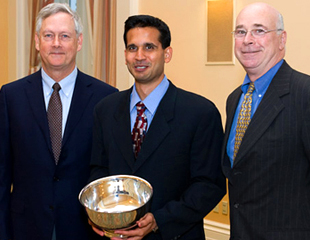Harvard Business School Holds First Alumni New Venture Contest
|
BOSTON— Teams led by entrepreneurial Harvard Business School alumni representing seven domestic and international regions presented business plans for their start-ups to judges on Monday during the final round of the School’s first Alumni New Venture Contest. Representing the HBS Club of India, Krishna Mahesh (MBA 2005), founder and CEO of Sundaram Medical Devices, took top honors against teams representing HBS Alumni Clubs in Boston, Chicago, London, New York, Northern California, and Southern California. The result was announced on Tuesday night at the finals and awards ceremony for the HBS student Business Plan Contest. According to Mahesh, Sundaram Medical Devices, based in the city of Chennai in southern India, is using “the engineering rigor, high standards, and cost control of the Indian automotive industry to develop a high-tech, low-cost medical bed that meets the highest standards of quality, safety, and usability both for the patient and the care-giver in Indian healthcare institutions. With a population of a billion people and a shortage in excess of 3 million beds, the market for locally manufactured medical beds is dramatically underserved.”  (LtoR): Professor William A. Sahlman, Krishna
(LtoR): Professor William A. Sahlman, Krishna Mahesh (MBA ’05), Michael Roberts, Executive Director of the Arthur Rock Center for Entrepreneurship Modeled after the HBS student Business Plan Contest, now in its 14th year, the Alumni New Venture Contest was designed to support promising new ventures founded by HBS graduates. As the winning entry, Sundaram was awarded a $25,000 cash prize. In addition, every finalist team received mentoring from an HBS faculty member prior to the judging and participated in an on-campus educational session during the finals. The finals of the contest were judged by a panel of HBS faculty members and alumni from fields such as venture capital, consulting, law, accounting, life sciences, and technology. “We conceptualized the Alumni New Venture Contest with two goals in mind," said Lynda M. Applegate, the School’s Martin Marshall Professor of Business Administration and chair of the Entrepreneurial Management Unit, which is composed of more than 30 faculty members. "First, we wanted to identify promising new business ventures among our very entrepreneurially-oriented alumni body; second, and perhaps more important, we were eager to create a formal mechanism to connect alumni who are starting new companies with faculty expertise and the global HBS network of entrepreneurs, venture capitalists, and angel investors.” “I have been impressed by the turnout of more than 70 teams, the care and diligence that the HBS Clubs brought to planning the regional contests, and the passion and quality of ideas that all the participants brought to this initial competition,” she added. The regional finalists were chosen in March during contests held at seven HBS Alumni Clubs around the world. In addition to Sundaram Medical Devices, the regional finalists, representing a wide variety of new enterprises from biobanks to microgames, were as follows:
Ten to fifteen years after graduation, more than 50 percent of HBS alumni classify themselves as entrepreneurs. Among the many alumni who have founded successful business ventures are Tom Stemberg (MBA 1973), founder of Staples; Scott Cook (MBA 1976), chairman and cofounder of Intuit; Michael Bloomberg (MBA 1963), founder of Bloomberg L.P.; Marla Malcolm Beck (MBA 1998), founder of Blue Mercury; Jeff Bussgang (MBA 1995), cofounder of UPromise; and Jeremy Stoppelman (MBA 2005), CEO and cofounder of Yelp. |
About Harvard Business School
Harvard Business School, located on a 40-acre campus in Boston, was founded in 1908 as part of Harvard University. It is among the world's most trusted sources of management education and thought leadership. For more than a century, the School's faculty has combined a passion for teaching with rigorous research conducted alongside practitioners at world-leading organizations to educate leaders who make a difference in the world. Through a dynamic ecosystem of research, learning, and entrepreneurship that includes MBA, Doctoral, Executive Education, and Online programs, as well as numerous initiatives, centers, institutes, and labs, Harvard Business School fosters bold new ideas and collaborative learning networks that shape the future of business.
